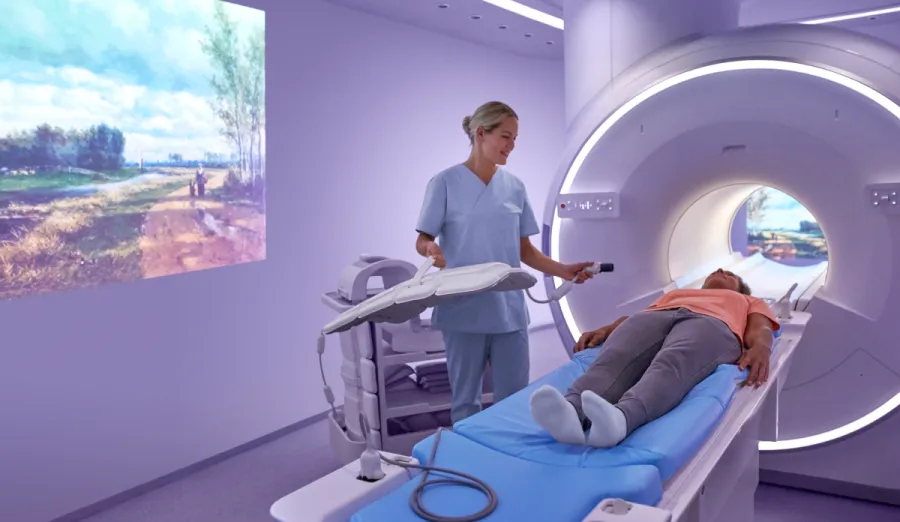
Why would I need an MRI?
MRI stands for Magnetic Resonance Imaging. It’s a safe, non-invasive test that uses a strong magnetic field and radio waves to take detailed images of organs and tissues. Unlike X-rays or CT scans, an MRI does not use any radiation. Some MRI exams may involve an IV or oral contrast agent.
Your doctor might order an MRI if:
- X-rays or CT scans don’t provide enough detail
- You’ve had an injury, such as a torn ligament
- You have unexplained pain, swelling or numbness
- They need to check for conditions like tumors, strokes, herniated discs or arthritis
How do I prepare for an MRI?
A few days before your appointment, someone from the MRI team will call you to review the process and make sure it’s safe for you to have the exam. Be sure to let them know if you have any metal or electronic implants in your body. Additional paperwork may be required to confirm safety.
- Eating and drinking: Most MRI exams do not require dietary restrictions. The MRI staff will let you know if your exam does. Continue taking your medications as prescribed.
- Claustrophobia: If you think you might feel anxious in the scanner, ask your doctor about a mild sedative to help you relax.
- Clothing: Wear clothes that are easy to change out of. You will change into a hospital gown for the scan.
- Valuables: Valuables are not allowed in the exam room. Lockers are available, but we recommend leaving valuables at home.
What can I expect when I arrive for my MRI?
- Check-in: Arrive 30 minutes before your appointment to complete forms and review your medical history.
- Review: An MR technologist will ask about any implants, metal, and whether you are claustrophobic.
- Get comfortable: You’ll lie on a padded table. A blanket and pillow are often provided. Earplugs are available due to loud tapping sounds during the scan.
What happens during an MRI?
- The table will slide into the scanner.
- You’ll hear knocking or thumping noises — that’s the magnet at work.
- Stay as still as possible for clear images.
- You’ll have a call button to alert the technologist if you need assistance.
- Most scans take 15–90 minutes, depending on the area being imaged.
I'm claustrophobic. Can I still get an MRI?
You’re not alone — and there are ways to make the experience easier:
- Talk to your doctor ahead of time: They can prescribe a mild sedative if needed.
- Try visualization: Imagine a peaceful place like a beach, forest or cozy room.
- Keep your eyes closed: Eye masks and stress balls are available to help you relax.
- Bring a support person: They must be screened in advance to stay in the room with you.
What happens after an MRI?
Once your scan is complete, you can change back into your clothes and go about your day and return to your normal activities. A radiologist will review the images and send a report to your doctor, who will follow up with you.
Debunking common MRI myths
- Myth: MRIs use harmful radiation
- Fact: MRIs do not use ionizing radiation. They rely on safe magnetic fields and radio waves.
- Myth: You can’t have an MRI if you have metal in your body
- Fact: Some implants may require special review, but many modern devices are MRI-safe. The technologist will evaluate your specific case.
- Myth: The machine will touch or crush you
- Fact: The scanner is fixed and doesn’t press against your body. Only the table moves in and out.
- Myth: MRIs are painful
- Fact: The exam is painless. The loud sounds can be startling, but earplugs help. We’ll make sure you’re comfortable before the scan begins.
- Myth: You’ll feel the magnetic pull
- Fact: You won’t feel the magnet. At most, you may notice slight warmth or vibration.
Bottom line
An MRI is a safe, painless way for your doctor to get a clearer picture of what’s happening inside your body. It’s normal to feel nervous at first, but you’ll always be in control. You're taking an important step toward finding answers, understanding your health and feeling better.


